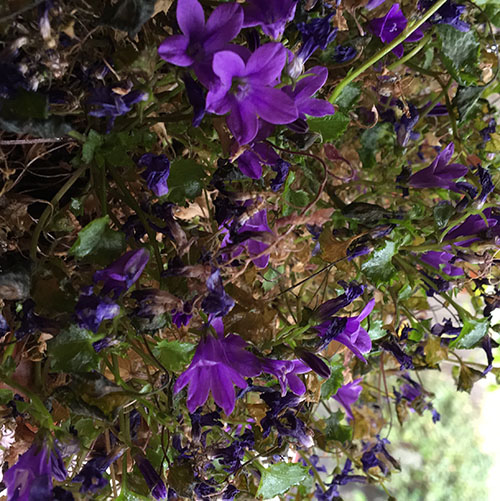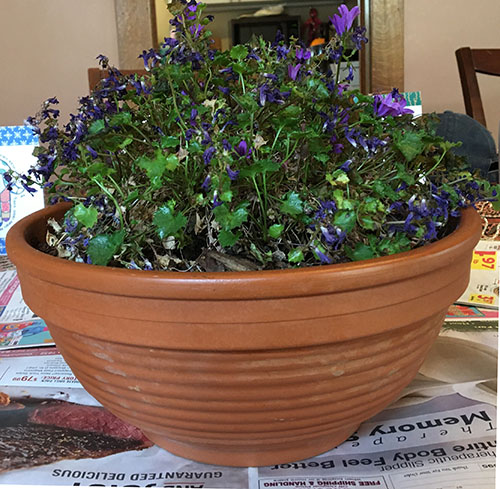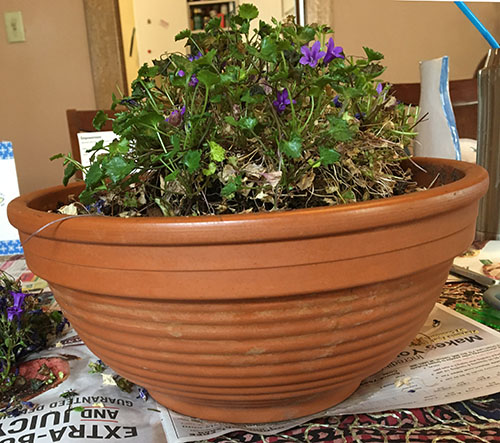
The other day I noticed that one of my plants wasn’t doing very well. The Bellflower usually thrives and puts out lots of new growth and flowers. Lately, however, I noticed a lot of dead leaves and flowers. I tried to water them more often. I treated them for aphids. No improvement. In fact the plant looked more bedraggled every day.
I did some research and learned Bellflowers liked to have a good “haircut” when they’re overgrown. I was worried that this would kill the plant altogether but felt it was worth trying. If the plant died it was a result I could live with.

Following the expert’s guidelines, I cut most of the plant’s grow to about two-thirds and left the center core intact.
 \
\
The cut-down plant looked kind of sad but I hoped for the best.
There’s a term “creative destructionism” which refers to getting rid of things, even things that are working, to make room for new opportunities. A coaching instructor liked to say doing this would create a kind of energetic vacuum which would move you forward towards your goal.
I like the idea of “making space” to allow for new growth; new opportunities. But it’s scary to get rid of something before you know what will show up.
Trimming my Bellflower is a very low-risk example. If the Bellflower died, I would be sad but it would be a small loss. One I could live with.
I have taken larger risks in my life. At one point I quit a dead end job and went to business school full time to get my MBA. I went into debt to do that. I was risking the possibility that I wouldn’t get the type of job that would allow me to pay off my loans. Fortunately I found a well-paying job with a good company. I gave something up and created something a lot better.
Several years ago I decided to step away from a successful technical writing career to become a life coach. That risk didn’t pay off financially although I feel it paid off in other important ways.
Life also has a way of making space for us whether we like it or not. Because of the pandemic, thousands of people have lost jobs, businesses have closed, and many have lost their lives and the lives of those they love. Making space can be spiritually expansive but to make space we have to give something up. Even when it’s a dead-end job or a sad-looking houseplant, we lose what is familiar. And familiarity offers comfort, especially in uncertain times.
I used to be impatient with myself when I felt fear and resistance. I would try to ignore the fear and feelings of vulnerability. I didn’t want to seem weak to myself or others.
These days I’m willing to slow down and acknowledge that I’m afraid because it means I may lose something I value. I usually find my fear is protective. It’s an old impulse from times when I was too young to take care of my distress. When I witness fear with compassion rather than judgement, I heal. It’s a way of saying to those old protective impulses, “you don’t need to protect me anymore, I have more resources and I’ll be OK.” I notice I don’t get as triggered by these situations.
This is not an easy or automatic choice for me. I am learning, slowly, to pause and reconsider how to deal with fear. Spiritual practices help.
This story has a happy ending by the way. My Bellflower plant is looks happy and is putting out new growth and flowers. Other losses don’t produce positive results quickly if at all. I think the point is to find a measure of peace around the loss regardless of the consequences. And I’ve found in the course of my life that even the worst losses produce something positive when viewed over the passage of time.
